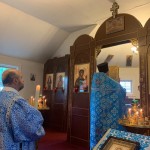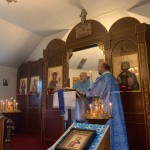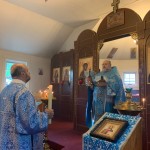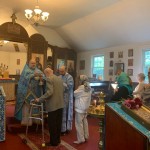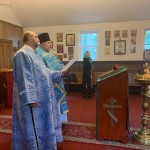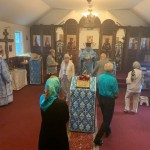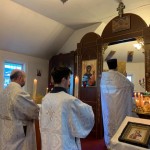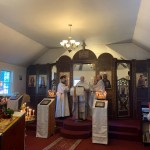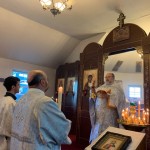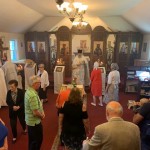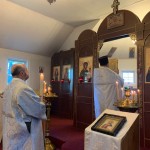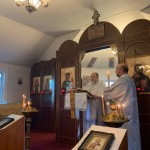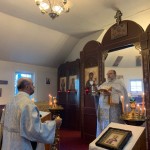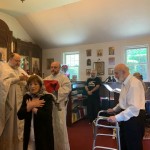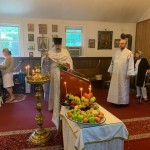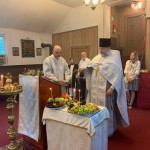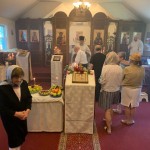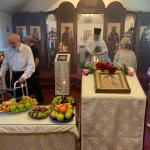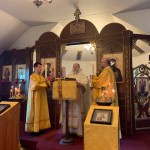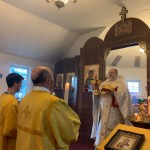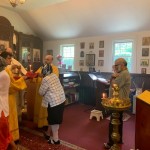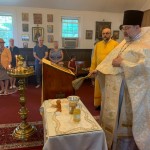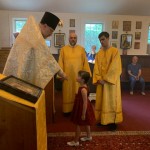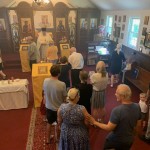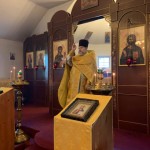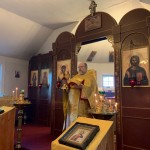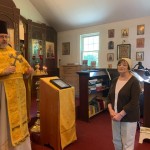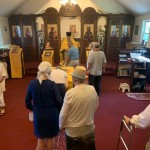On August 25, on the 10th Sunday after Pentecost, St. George parish family had a nice celebration. Our Rector, Archpriest Igor Tarasov served the Divine Liturgy in our temple. Following the readings from the Sacred Scripture he preached a homily in Russian on the appointed Gospel lesson:
“Дорогие во Христе братия и сестры! Главные мысли сегодняшнего Евангельского чтения о вере, молитве и посте.
Продолжая праздновать Преображение Господне, мы вспоминаем нетварной Фаворский свет Божества, который возсиял мiру и дал возможность человеку стать причастником Божественной природы. Ведь Христос пришел на землю, чтобы спасти человека, победить грех и ад, восставить падшего Адама, вернуть человеку его человеческое достоинство, и более того, чтобы дать ему возможность стать богом по благодати. «Если Бог стал человеком, то и жизнь Божественная стала жизнью человеческой, и могущество Божественное стало могуществом человеческим, и истина Божественная стала истиной человеческой, и правда Божественная стала правдой человеческой: все Божие стало человеческим», – так пишет преподобный Иустин Попович.
Но размышляя об этом и о сегодняшнем Евангелии о том, что если бы мы имели малую веру, как горчичное зерно, то могли бы передвигать горы, надо сказать, что за словами Господа о перемещении гор открывалась новая реальность. А именно, объявляется закон новой жизни, новой жизни нового человека, человека веры и могущества, человека, для которого нет теперь ничего невозможного. Вера вселяет в человека всего Бога — как говорит апостол Павел, «уже не я живу, но живет во мне Христос» (Гал. 2, 20), — тогда человеку все Божественное становится возможно — как снова говорит апостол Павел, «все могу в укрепляющем меня Иисусе Христе» (Флп. 4, 13).
Но главное в этом всемогуществе, как пишет тот же преподобный Иустин Попович, «силой воли своей повести и привести Богу всю душу свою, все сердце свое, весь ум свой, всю крепость свою, сплавить их в единый подвиг — веры в Богочеловека, и тогда человеку даются все Божественные силы и все Богочеловеческие добродетели, нужные ему для вечной жизни в обоих мiрах (см.: 2 Пет. 1, 3-8)».
Итак, сильная вера дает человеку божественное могущество. Но если посмотрим вокруг, то едва ли видим многих, имеющих такую сильную веру. Даже среди нас, верующих православных, есть люди, которые веруют поверхностно. Заявляют о свем православии, а сами живут жизнью мiра сего и его страстей. А если вообще посмотреть на мiр, то большинство людей сейчас вообще не думают о вечной жизни, о спасении, о Боге. И можно спросить: «Как же так?» Ведь Господь наш Иисус Христос спас всех нас, искупил всех нас на кресте. А потом Своим Воскресением из мертвых Он опустошил ад. Вывел из ада всех праведников, всех томившихся там. Двери рая открыты для человека! Но человек туда не спешит.
Да, дорогие братия и сестры, дверь спасения открыта Христом. Но насильно никто туда не будет толкать. Поэтому далеко не все проявляют веру и ищут силы Божией.
О таких сегодня в Евангелии воскликнул Христос: «О роде неверный и развращенный, доколе буду с вами? Доколе буду терпеть вас» (Мф. 17, 17). Вот так вопрошает Спаситель. Вопрошает, ибо Ему нужны верные люди. Но сами знаем, как немного таких. И опять, говоря о нашей жизни, можем также вместе со Христом воскликнуть, глядя на людей: «О роде неверный и развращенный!» Возьмите наш город Нью-Йорк: в нем ведь сейчас грех возведен в закон. И раньше города жили во грехах, но по крайней мере, внешне соблюдались приличия и грех не поддерживался. А ныне грех стал похваляем и законен. Беззаконе стало законом! Поэтому и мы, верующие христиане, можем воскликнуть: «Доколе будем терпеть вас?»
Однако на этот вопрос «доколе» Господь Сам дал ответ в другом месте Святого Евангелия. Он сказал: «Я с вами до скончания века» (Мф. 28, 20). Т.е. Господь всегда с нами, если мы сами хотим Его, хотим Его помощи, веруем в Него. Господь всегда готов быть рядом с нами, помочь нам, если мы сами Его просим, любим и веруем в Него.
Христианство – относительно легкая религия, ибо в ней мы хоть и должны взбираться на высокую гору совершенства, Господь постоянно сходит с этой горы к нам и помогает нам по ней взбираться. Но для того, чтобы Он к нам спускался, нужна твердая вера.
А делами этой нашей веры являются, согласно сегодняшнего Евангелия, молитва и пост. Без них наша вера не осуществится. Поэтому нет настоящей веры у тех, кто только о ней заявляет, но не практикует молитву и не соблюдает пост.
Поэтому, дорогие братия и сестры, давайте стараться жить верою, творить молитву и упражняться в посте – тогда и мы достигнем великих дел в этой жизни и удостоимся войти в жизнь вечную.”
The choir beautifully performed the hymns in honor of the Holy Theotokos before the Communion.
After the dismissal of the Liturgy the Rector preached a brief sermon in English addressing the thoughts of his Russian homily.
Following the liturgical service the Rector and parishioners had a modest luncheon and coffee enjoying lenten refreshments and a nice company. The Rector congratulated our parishioner Olga Vnukova on the occasion of her past birthday. A traditional Polychronion (“Mnogaia leta!”) was proclaimed.

